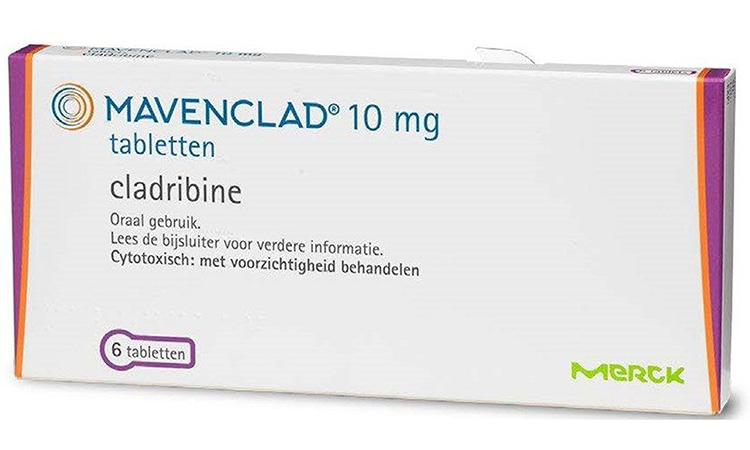Mavenclad (cladribine) vs Tyruko (natalizumab-sztn)
Mavenclad (cladribine) vs Tyruko (natalizumab-sztn)
Mavenclad (cladribine) is an oral medication used to treat multiple sclerosis (MS) by selectively suppressing the immune system to reduce the frequency of relapses and slow the progression of disability. In contrast, Tysabri (natalizumab), which is administered intravenously, is a monoclonal antibody that prevents immune cells from crossing blood-brain barrier, thereby reducing inflammation and relapse rates in MS. The choice between Mavenclad and Tysabri would depend on a patient's specific clinical scenario, including disease activity, treatment history, and risk tolerance for potential side effects, such as Mavenclad's association with a risk of malignancy and Tysabri's risk of a rare but serious brain infection called PML (progressive multifocal leukoencephalopathy).
Difference between Mavenclad and Tyruko
| Metric | Mavenclad (cladribine) | Tyruko (natalizumab-sztn) |
|---|---|---|
| Generic name | Cladribine | Natalizumab-sztn |
| Indications | Multiple sclerosis (MS) | Multiple sclerosis (MS), Crohn's disease |
| Mechanism of action | Lymphocyte reduction | Integrin antagonist |
| Brand names | Mavenclad | Tyruko, Tysabri |
| Administrative route | Oral | Intravenous |
| Side effects | Lymphopenia, infection risk | Headache, fatigue, infusion reactions |
| Contraindications | HIV infection, active chronic infections | Progressive multifocal leukoencephalopathy (PML), hypersensitivity |
| Drug class | Antimetabolite | Monoclonal antibody |
| Manufacturer | Merck | Biogen |
Efficacy
Mavenclad (Cladribine) for Multiple Sclerosis
Mavenclad (cladribine) is an oral medication approved for the treatment of relapsing forms of multiple sclerosis (MS), including relapsing-remitting disease and active secondary progressive disease in adults. The efficacy of Mavenclad was demonstrated in clinical trials, such as the CLARITY study, which showed that cladribine significantly reduced the annualized relapse rate (ARR) in patients with relapsing MS compared to placebo. Additionally, the medication was found to reduce the risk of disability progression and the number of lesions detected by MRI scans, indicating its effectiveness in slowing down the physical and neurological impacts of the disease.
The mechanism by which Mavenclad exerts its therapeutic effects in MS is not fully understood, but it is known to induce a reduction in certain white blood cells, particularly lymphocytes, which are thought to be involved in the pathological process of MS. By targeting these cells, Mavenclad helps to modulate the immune response and reduce the frequency and severity of relapse episodes. However, due to its immunosuppressive action, the use of Mavenclad is generally reserved for patients who have had an inadequate response to, or are unable to tolerate, an alternate drug indicated for the treatment of MS.
Tysabri (Natalizumab) for Multiple Sclerosis
Tysabri (natalizumab), given as an intravenous infusion, is another medication approved for the treatment of relapsing forms of multiple sclerosis. Its efficacy has been established in several clinical trials, including the AFFIRM and SENTINEL studies. These trials have shown that natalizumab significantly reduces the ARR and the progression of disability in individuals with relapsing-remitting MS. Additionally, MRI findings from these studies have demonstrated that natalizumab can lead to a decrease in the number and volume of active brain lesions, which are characteristic of MS.
Natalizumab works by blocking the movement of potentially damaging immune cells from the bloodstream, across the blood-brain barrier, into the brain and spinal cord. This mechanism is believed to reduce the inflammation and damage that leads to the neurological symptoms of MS. While Tysabri is highly effective, it is associated with an increased risk of progressive multifocal leukoencephalopathy (PML), a rare but serious brain infection. Therefore, it is typically used for patients who have not responded adequately to other treatments for MS or for whom other treatments are contraindicated.
Regulatory Agency Approvals
Mavenclad
-
European Medical Agency (EMA), European Union

-
Food and Drug Administration (FDA), USA

-
Health Canada

-
Therapeutic Goods Administration (TGA), Australia

-
Medsafe (NZ)

Tyruko
-
European Medical Agency (EMA), European Union

-
Food and Drug Administration (FDA), USA

Access Mavenclad or Tyruko today
If Mavenclad or Tyruko are not approved or available in your country (e.g. due to supply issues), you can access them via Everyone.org.
How it works

Make an enquiry
Choose the medicine you want to buy, answer a couple of questions, and upload your prescription to speed things up. We’ll get back to you within 24 hours.


Make an enquiry
Choose the medicine you want to buy, answer a couple of questions, and upload your prescription to speed things up. We’ll get back to you within 24 hours.


Breeze through the paperwork
We'll guide you through the required documents for importing unapproved medicine, ensuring you have all the necessary information.


Get a personalized quote
We’ll prepare a quote for you, including medicine costs and any shipping, administrative, or import fees that may apply.


Receive your medicine
Accept the quote and we’ll handle the rest - sourcing and safely delivering your medicine.

Some text on this page has been automatically generated. Speak to your physician before you start a new treatment or medication.
Let's talk
If you have any questions, call us or send us a message through WhatsApp or email:
Contact us




